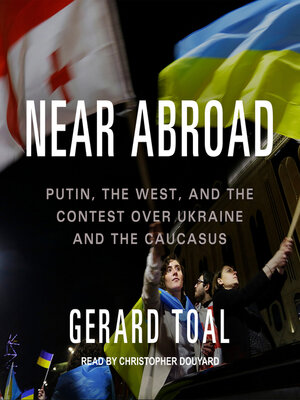Near Abroad
audiobook (Unabridged) ∣ Putin, the West, and the Contest over Ukraine and the Caucasus
By Gerard Toal

Sign up to save your library
With an OverDrive account, you can save your favorite libraries for at-a-glance information about availability. Find out more about OverDrive accounts.
Find this title in Libby, the library reading app by OverDrive.



Search for a digital library with this title
Title found at these libraries:
| Library Name | Distance |
|---|---|
| Loading... |
Before Russia invaded Ukraine, it invaded Georgia. Both states are part of Russia's "near abroad"—newly independent states that were once part of the Soviet Union. While the Russia-Georgia war of 2008 faded from the headlines in the wake of the global recession, the geopolitical contest that created it did not. Six years later, the specter of a revanchist Russia returned when Putin's forces invaded and annexed the Crimean peninsula. Crimea's annexation and follow on conflict in eastern Ukraine have generated the greatest geopolitical crisis on the European continent since the end of the Cold War.
In Near Abroad, the eminent political geographer Gerard Toal moves beyond the polemical rhetoric that surrounds Russia's interventions in Georgia and Ukraine to study the underlying territorial conflicts and geopolitical struggles. Central to understanding are legacies of the Soviet Union collapse: unresolved territorial issues, weak states and a conflicted geopolitical culture in Russia over the new territorial order. The West's desire to expand NATO contributed to a growing geopolitical contest in Russia's near abroad. This found expression in a 2008 NATO proclamation that Georgia and Ukraine will become members of NATO, a "red line" issue for Russia. The road to invasion and war in Georgia and Ukraine, thereafter, is explained in Near Abroad.
In Near Abroad, the eminent political geographer Gerard Toal moves beyond the polemical rhetoric that surrounds Russia's interventions in Georgia and Ukraine to study the underlying territorial conflicts and geopolitical struggles. Central to understanding are legacies of the Soviet Union collapse: unresolved territorial issues, weak states and a conflicted geopolitical culture in Russia over the new territorial order. The West's desire to expand NATO contributed to a growing geopolitical contest in Russia's near abroad. This found expression in a 2008 NATO proclamation that Georgia and Ukraine will become members of NATO, a "red line" issue for Russia. The road to invasion and war in Georgia and Ukraine, thereafter, is explained in Near Abroad.







